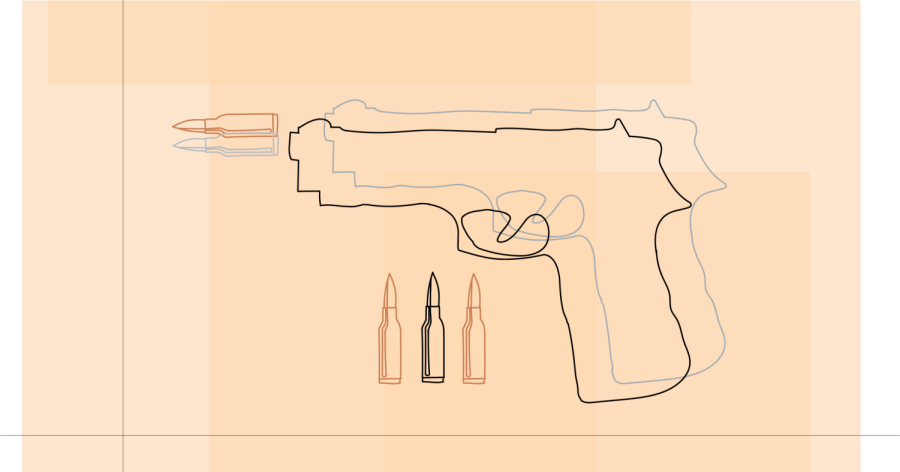Shadley: The Legislature’s Attempt to Ban Target Shooting During Fire Season Doesn’t Do Much
(Graphic by Emily Christensen | The Daily Utah Chronicle)
February 2, 2022
The 2021 fire season started two weeks earlier than normal in Utah. Hotter and drier summers continue to bring severe drought conditions. And our neighboring state, Colorado, just suffered a major wildfire in late December. A Utah where, unless there’s snow on the ground, an errant spark starting a wildfire any day of the year is becoming a reality.
Utahns should adapt to high fire danger being the norm, not the exception. And so far, we’ve done a pretty good job. People started over 900 fewer wildfires in 2021, a reduction of 62% from 2020. While that’s a good start, the climate crisis continues to fry Utah’s vegetation, so we must continue minimizing human-induced wildfires.
Target shooting caused 50+ fires in 2020, including one that burned over 3,500 acres. H.B. 141 would regulate the practice of shooting targets with a firearm in areas and times when fire danger is “extreme.” While this bill would prevent some accidental fires from sparking, it isn’t as effective as it could be.
How a Bullet Becomes a Wildfire
Most bullets don’t come out of a gun hot enough to start a fire. The time spent in the air cools the bullet off before it has the chance to come into contact with dry kindling. Instead, fires caused by firearms happen when a stray bullet misses its target and hits a rock on the ground. The bullet shatters, causing bits of metal to slice across the rock face, resulting in a spark. Like steel striking flint. If that spark lands on one of the ever-increasing number of dry shrubs, it’s only a matter of hours before flames swallow up entire ecosystems.
How the Bill Fails to Fight Fires
H.B. 141 would ban target shooting in areas managed by the Division of Wildlife Resources where the danger of sparks igniting a fire are “extreme.” However, it only does so in the event that both the Director of the Division of Wildlife Resources and the county sheriff in the area agree to the terms of a target shooting prohibition. That prohibition must undergo a review every 14 days, and it can only remain in place as long as conditions remain “extremely hazardous.”
While this bill will probably prevent a handful of wildfires from starting, it feels like a lousy attempt to placate Utahns concerned about wildfires. This bill allows the legislature to say they banned target shooting to reduce wildfires, but not actually do anything meaningful.
Fire danger comes in five nationally recognized levels: Low, Moderate, High, Very High, and Extreme. During “Very High” fire danger, the National Parks Service says, “fires start easily from all causes and may spread faster than suppression resources can travel.” Yet, those conditions wouldn’t warrant a prohibition on target shooting under H.B. 141. Even when target shooting can easily cause wildfires, this bill would prevent any prohibition against doing so.
At least the bill allows for prohibitions during “Extreme” fire danger, where “fires start and spread rapidly.” But that only happens when both the county sheriffs and the Director of the Division of Wildlife Resources jump through enough bureaucratic hoops to instate a prohibition for 14 days. And a ban can only be effective if people are aware of it.
When rules change every 14 days and vary on a county-by-county basis, only the most diligent target shooters will stay apprised of what is and isn’t allowed. Everyone else can easily claim to have not known that target shooting wasn’t allowed that day. And when the bill doesn’t provide any guidelines for enforcement, they don’t even need to have that excuse. People can continue to engage in target shooting on any day, even in the unlikely event that a prohibition is in place. That doesn’t sound like a bill designed to fight fires, it sounds like one designed to protect the ability to target shoot.
A Better Version of H.B. 141
H.B. 141 could have been an opportunity to improve air quality, protect ecosystems and protect property. It could clearly ban target shooting for the duration of the wildfire season, like the Bureau of Land Management does on Utah’s federal lands. People who violate that ban receive a fine of $1,000, whether they can come up with an excuse or not.
By setting the standard that target shooting is prohibited for the duration of the wildfire season, and that prohibition will be strictly enforced, the legislature could eliminate nearly all wildfires caused by target shooting in 2022. Instead, we get this weaker, convoluted version of H.B. 141.
If Rep. Whyte and Sen. Hinkins, the sponsors of the bill, genuinely want to prevent wildfires caused by target shooting, they should try again.








